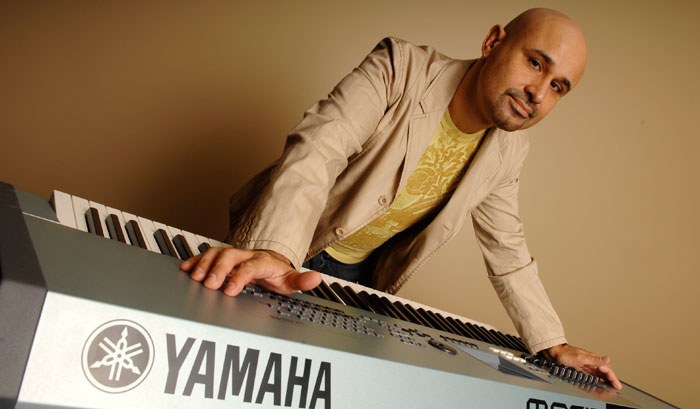


"This is a great gig," raves keyboardist Ricky Gonzalez about his current stint with Marc Anthony and Jennifer Lopez. "I get to play six or seven genres in one night--and do it convincingly."
Touring with the husband-and-wife superstars may be Gonzalez's most high-profile gig, but his lengthy resume includes work with some of the era's greatest Latin musicians, including Tito Puente, Mongo Santamaria, Ray Barreto, and Celia Cruz. He's also racked up many credits as an arranger, composer, and producer, including his production on Tito Nieves's breakout hit "I Like It Like That."
Yamaha has always had the best feel of any electronic keyboard. You really can close your eyes and feel like you're playing an acoustic piano.
"Playing with Jennifer is definitely the farthest I've gone into the pop mainstream," notes Gonzalez, who has played with Anthony for the last decade. "I play in both their shows, which are completely different. Marc's show is pure music, all played live. It's hard-edged and traditional, with no bells or whistles. I get to play traditional Latin acoustic piano, plus combinations of orchestral string and woodwind parts."
And the J. Lo show? "Totally different," replies Ricky. "For one thing, the show is programmed around the choreography and pyro and so forth, so we play to a click trick, which is harder to do. But it's a great gig because we get to play everything: salsa, hip-hop, R&B."
Gonzalez has always been a versatile musician. Born in the Dominican Republic, he was playing his uncle's drum set by the time he turned three. He soon became an accomplished percussionist, but took up the piano at age 12 because he wanted to compose. He studied classical composition at New York's famed Juilliard School of Music, then continued his studies at City College of New York. "At City they had separate programs for classical and jazz," explains Ricky. "I went there for jazz, but I devoured the classical stuff and earned my degree in two years." His instructors included legendary jazz bassist Ron Carter and Pulitzer-winning classical composer David del Tredici.
Gonzalez developed an encyclopedic knowledge of classical, jazz, and Latin music--and the areas where the styles intersect. "Latin music is improvisational, like jazz," he explains. "It's very free and open. There are rarely written parts for the rhythm section. Players usually come up with their own comps and vamps. The style is also exciting because of the interplay between the different sections in the band. It's not just the bass, piano, and percussion in the rhythm section--there's rhythmic interplay with the vocalists and horns too. There's less of a line between the different sections of a salsa band compared to some other genres. That rhythmic element has to be there."
Ricky offers a concise definition of that cornerstone of Latin piano playing, the montuno: "It's a percussive and melodic style of playing where you break up chords into rhythmic patterns so that you create a melodic pattern while still playing within the rhythm section. The word has a second definition too: the vamp section in a Latin music piece."
These days, Gonzalez's principal montuno machines are Yamaha Motif keyboards. "I use two on tour," he says, "including a new Motif XS8. In my studio I have a Motif EX7 and a rack-mounted Motif module. I have other gear too, but it never gets turned on. I know I sound like a TV commercial, but it's true! The Yamaha stuff gives me all the colors and voices I want as an orchestrator and producer. Obviously, I use the pianos and electric pianos a lot, but I also use the orchestral sounds in my arranging work. And now that I'm playing with Jennifer, I use a lot of electronic sounds for the hip-hop and R&B material. I can combine sounds for a client and come up with patches quickly, because it's so easy to find the sounds I want--in fact, Marc's show is so live that I don't even program the keyboards in advance. And of course, Yamaha has always had the best feel of any electronic keyboard. You really can close your eyes and feel like you're playing an acoustic piano."
Besides touring the world with Lopez and Anthony, Gonzalez plans to complete a second solo album, a follow-up to 2004's Oasis. He's also on a self-appointed mission to educate both players and the public about the richness of Latin music.
"Did you ever see a movie where they're showing a mariachi band, but the sound you hear is Spanish guitar and castanets?" snorts Ricky. "It's become almost accepted that they signify the same thing, even though one is from Europe and one is from Mexico. I welcome the opportunity to help people know the difference between Spanish flamenco and Brazilian samba!"
(Photography Credit: Rob Shanahan)
























